ARETHA FRANKLIN / “Day Dreaming”
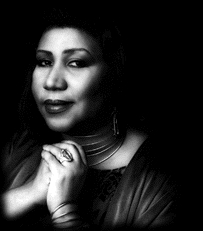 Today, while listening to some Aretha Franklin songs, I started thinking about expectations and reputations. I was thinking about how Aretha eventually gained a reputation as one of, if not the, premier ‘shouters’ in R&B. By virtue of classic sides like “I Never Loved A Man,” “Dr. Feelgood,” “Do Right Woman” and “Respect,” as well as the entire Aretha Gospel album, Ms. Franklin became the last word in soul vocalizing. So much so that, today, forty years since Aretha actually cut “Dr. Feelgood,” any young female vocalist with a big voice and a little tunefulness is still being compared to Lady Soul. But what about Aretha’s other side?
Nothing against Aretha’s biggest hits – honestly, they’re classics for a reason – but my favorite Aretha Franklin songs are the quiet, gentler ones. The real reason Aretha is so revered as a vocalist is she could do it all. She could blast the walls off the place if that’s what she wanted to do, but if the occasion called for it, she could also croon a delicate melody sweetly enough to make you swoon.
Today, while listening to some Aretha Franklin songs, I started thinking about expectations and reputations. I was thinking about how Aretha eventually gained a reputation as one of, if not the, premier ‘shouters’ in R&B. By virtue of classic sides like “I Never Loved A Man,” “Dr. Feelgood,” “Do Right Woman” and “Respect,” as well as the entire Aretha Gospel album, Ms. Franklin became the last word in soul vocalizing. So much so that, today, forty years since Aretha actually cut “Dr. Feelgood,” any young female vocalist with a big voice and a little tunefulness is still being compared to Lady Soul. But what about Aretha’s other side?
Nothing against Aretha’s biggest hits – honestly, they’re classics for a reason – but my favorite Aretha Franklin songs are the quiet, gentler ones. The real reason Aretha is so revered as a vocalist is she could do it all. She could blast the walls off the place if that’s what she wanted to do, but if the occasion called for it, she could also croon a delicate melody sweetly enough to make you swoon.
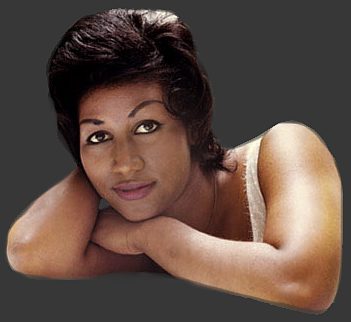 Whether it was tender pop tunes in the sixties or gentle soul songs in the seventies, Aretha had the ability and the artistic maturity to keep that vocal firepower of hers in check. I’m talking about songs like “I Say A Little Prayer” from 1968’s Aretha Now LP, or how’s about “Day Dreaming” from 1972’s Young, Gifted And Black. Both records are so soft and wistful – it’s almost like they aren’t really there. It’s as if you’re dreaming them instead of actually hearing them. Or try “Angel” from 1973’s Hey Now Hey and “One Step Ahead,” which was originally released as a single way back in 1965. On “Angel,” Aretha lets a tiny bit of that gospel fire come through, but for the most part, it’s more of the gentle side of The Queen – a wistful, almost prayerful plea for love and tenderness.
“One Step Ahead” first came my way as the sample source for a Mos Def hit, but since then, it’s become one of my favorite Aretha Franklin songs. It’s not just Aretha’s vocal performance. The lyrics too are a thing of beauty. The narrator sings about how she’s only one step away from either ending or restarting a love affair. In the first verse, she imagines the heartbreak and misery she’ll have if she takes that one step forward, a step that will take her away from her man. But then the lyrics also imply (though they never actually come out and say) that the lover she’s trying to leave has been unfaithful. So maybe the heartbreak and misery are waiting for her no matter what she does, no matter which step she takes. “It’s too soon to forget you,” Aretha sings, but, “It’s too late to be free.”
Aretha will always be known as Lady Soul, The Queen, the woman gifted with the biggest, brassiest and boldest voice of them all. But just know, there's another side to her artistry — the softer side. Check it out.
Whether it was tender pop tunes in the sixties or gentle soul songs in the seventies, Aretha had the ability and the artistic maturity to keep that vocal firepower of hers in check. I’m talking about songs like “I Say A Little Prayer” from 1968’s Aretha Now LP, or how’s about “Day Dreaming” from 1972’s Young, Gifted And Black. Both records are so soft and wistful – it’s almost like they aren’t really there. It’s as if you’re dreaming them instead of actually hearing them. Or try “Angel” from 1973’s Hey Now Hey and “One Step Ahead,” which was originally released as a single way back in 1965. On “Angel,” Aretha lets a tiny bit of that gospel fire come through, but for the most part, it’s more of the gentle side of The Queen – a wistful, almost prayerful plea for love and tenderness.
“One Step Ahead” first came my way as the sample source for a Mos Def hit, but since then, it’s become one of my favorite Aretha Franklin songs. It’s not just Aretha’s vocal performance. The lyrics too are a thing of beauty. The narrator sings about how she’s only one step away from either ending or restarting a love affair. In the first verse, she imagines the heartbreak and misery she’ll have if she takes that one step forward, a step that will take her away from her man. But then the lyrics also imply (though they never actually come out and say) that the lover she’s trying to leave has been unfaithful. So maybe the heartbreak and misery are waiting for her no matter what she does, no matter which step she takes. “It’s too soon to forget you,” Aretha sings, but, “It’s too late to be free.”
Aretha will always be known as Lady Soul, The Queen, the woman gifted with the biggest, brassiest and boldest voice of them all. But just know, there's another side to her artistry — the softer side. Check it out.
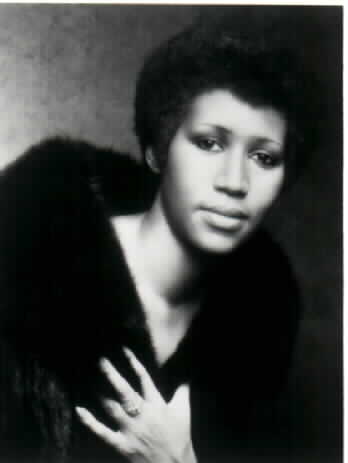 Most of it is from the first half of the seventies, the time of our people’s great ascendancy into the rarified air of self-determination in opposition to our oppression. We were escaping our exploitation, into the blue wonder of black folk going full out for what all that we know, all that we knew, and envisioned, and dreamed we could be. We said nationtime and started believing we actually could get together with each other.
Soft Aretha was natural Aretha. You ever seen her in the pictures from that era? The calmness of her visage. African attire. Her head crowned by a cinnamon-colored, sexy ‘fro. Natural woman. For sure.
Most of it is from the first half of the seventies, the time of our people’s great ascendancy into the rarified air of self-determination in opposition to our oppression. We were escaping our exploitation, into the blue wonder of black folk going full out for what all that we know, all that we knew, and envisioned, and dreamed we could be. We said nationtime and started believing we actually could get together with each other.
Soft Aretha was natural Aretha. You ever seen her in the pictures from that era? The calmness of her visage. African attire. Her head crowned by a cinnamon-colored, sexy ‘fro. Natural woman. For sure.
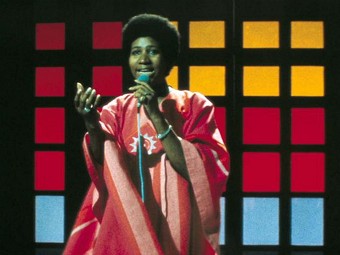 Blackness in our prime. What a number we was. Indivisible. Whole. A golden mean. In fact, as I remember her then, Aretha glowed, had a golden aura. She didn’t have to scream. There was nothing to fight or be in flight from. Hey, hey, hey we were on the other side of the sky.
Aretha soft was the best of us at one of the best of our moments on earth, especially this un-native soil of states united against our self expression. But we rose to unmatched heights anyway and got so far out there for a minute we were actually sun, moon and stars in our own universe. Yes. Softly shining.
That the miracle of our rising did not last is not the bottom line. The real deal is and will always be like James Brown said: there was a time. And knowing that there was a time is a rainbow promise that the comet of our consciousness can possibly return again. What goes around….
Blackness in our prime. What a number we was. Indivisible. Whole. A golden mean. In fact, as I remember her then, Aretha glowed, had a golden aura. She didn’t have to scream. There was nothing to fight or be in flight from. Hey, hey, hey we were on the other side of the sky.
Aretha soft was the best of us at one of the best of our moments on earth, especially this un-native soil of states united against our self expression. But we rose to unmatched heights anyway and got so far out there for a minute we were actually sun, moon and stars in our own universe. Yes. Softly shining.
That the miracle of our rising did not last is not the bottom line. The real deal is and will always be like James Brown said: there was a time. And knowing that there was a time is a rainbow promise that the comet of our consciousness can possibly return again. What goes around….
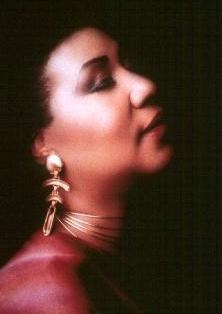 Aretha soft. Oh, my lord. Baby, baby, baby. It’s inside of me. Of us. And we’ll never let our softness harden. Never. Especially as long as we have records of Aretha touching us with the whisper of her powerful voice.
Soft Aretha voice. Aretha’s voice soft reaching into us. Into the softness of us. Touching us softly. Forever.
—Kalamu ya Salaam
P.S. On the factual side, the Aretha I really, really dig is the album you have selected: Young, Gifted And Black. Sometimes I put it on and just let it play over and over. It is not the one with the most-est hits, nor any of the bluesy R&B classics. Instead, this is the one where Aretha really hit her conscious Black woman stride. I mean check the first four cuts are: 1. “Oh Me Oh My (I’m A Fool For You Baby),” 2. “Day Dreaming,” 3. “Rock Steady,” and 4. “Young, Gifted And Black”. And that’s just the first quarter of the album.
As a bonus: you can go here and see clips of Aretha singing the first three songs from the album—and they are beautiful performances in which she gives a virtual clinic on soul singing.
My favorite cut is an Aretha Franklin original that is sounds like a soundtrack for an autobiographical movie. “First Snow In Kokomo” is both personal and a beautiful tribute to band members who travel on tour with Aretha—at least that is what it sounds like to me. Perhaps the mystery of not knowing for sure about whom these very specific descriptions were pinned, perhaps that uncertainty as to the specific origin of the images, perhaps that is what gives the song a greater impact. What is super clear is that Aretha really cares about these people and that caring is a beautiful caring. It is perhaps Aretha’s most intimate recording.
When you say soft Aretha, “First Snow” is the song I hear.
I think I should also include “Border Song (Holy Moses)”. The message is so timely. So necessary. So prime time Aretha. So classic soul. So softly insistent: can we live in peace?
Aretha soft. Oh, my lord. Baby, baby, baby. It’s inside of me. Of us. And we’ll never let our softness harden. Never. Especially as long as we have records of Aretha touching us with the whisper of her powerful voice.
Soft Aretha voice. Aretha’s voice soft reaching into us. Into the softness of us. Touching us softly. Forever.
—Kalamu ya Salaam
P.S. On the factual side, the Aretha I really, really dig is the album you have selected: Young, Gifted And Black. Sometimes I put it on and just let it play over and over. It is not the one with the most-est hits, nor any of the bluesy R&B classics. Instead, this is the one where Aretha really hit her conscious Black woman stride. I mean check the first four cuts are: 1. “Oh Me Oh My (I’m A Fool For You Baby),” 2. “Day Dreaming,” 3. “Rock Steady,” and 4. “Young, Gifted And Black”. And that’s just the first quarter of the album.
As a bonus: you can go here and see clips of Aretha singing the first three songs from the album—and they are beautiful performances in which she gives a virtual clinic on soul singing.
My favorite cut is an Aretha Franklin original that is sounds like a soundtrack for an autobiographical movie. “First Snow In Kokomo” is both personal and a beautiful tribute to band members who travel on tour with Aretha—at least that is what it sounds like to me. Perhaps the mystery of not knowing for sure about whom these very specific descriptions were pinned, perhaps that uncertainty as to the specific origin of the images, perhaps that is what gives the song a greater impact. What is super clear is that Aretha really cares about these people and that caring is a beautiful caring. It is perhaps Aretha’s most intimate recording.
When you say soft Aretha, “First Snow” is the song I hear.
I think I should also include “Border Song (Holy Moses)”. The message is so timely. So necessary. So prime time Aretha. So classic soul. So softly insistent: can we live in peace?
This entry was posted on Sunday, September 2nd, 2007 at 2:02 am and is filed under Classic. You can follow any responses to this entry through the RSS 2.0 feed. You can leave a response, or trackback from your own site.
One Response to “ARETHA FRANKLIN / “Day Dreaming””
September 21st, 2007 at 6:22 am
I’m a bit late, but just arrived on the slow train. “Young gifted and black” is not the Aretha album I’ve played most; but it’s the only one that can NEVER be on in the background. I’ve got to listen to every minute. Because it’s always seemed to me the most real of the real.
Leave a Reply
| top |